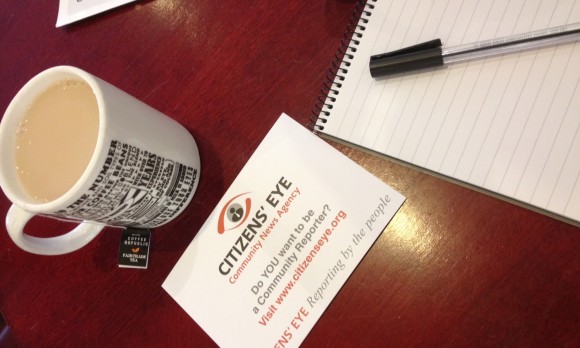Citizens’ Eye
The people of Leicester have been benefiting from an extensive network of community media thanks to Citizens’ Eye, discovers Figen Gunes. //
Citizens’ Eye was set up in 2007 in a bid to produce alternative content to the mainstream media by training citizen journalists. They became a community media training school run in cooperation with BBC Radio Leicester. Although it started as a news hub, Citizens’ Eye has turned into a community media consultancy to bring people together around social issues. The ethos of the community groups in Leicester is “broadcast something you are fired up about.”
Founded and coordinated by John Coster, the initiative’s members meet in Coffee Republic on Granby Street, Leicester, every Tuesday to discuss local issues. They use churches’ meeting rooms and cafes in the town as the no furniture/no office approach means everywhere can be their working space. News announced via their smartphone app reaches media professionals as well as members of the community at large.
Citizens’ Eye continues to play an integral part of community journalism in Leicestershire and further afield. As Citizens’ Eye moves into more of a consultancy role – and at the beginning of the very first certificated Community Media Course in partnership with the De Montfort University – more and more organisations and individuals are coming to terms with the significance of community media and how it can give them a voice.
Down Not Out, the news agency covering homelessness was set up in Leicester by John Coster in 2009, and was followed by Inside ‘n’ Out (INO) magazine and blog aimed at ex-offenders, and HAT News for refugees and asylum seekers in Leicester with the aim of stimulating local debate around those issues.
Mark Clark, a Citizens’ Eye ‘graduate’, has been the editor of INO since 2010 creating a magazine that goes to many prisons and probation trusts across the UK. “I am an ex-offender and John Coster and his team have given me the opportunity to set up my own criminal justice organisation,” he says. “I set up Inside ‘n’ Out (CIC) in 2012 and its aims are to inform people from the offending community and the public of the real issues around offending and offenders, educate ex/offenders of the opportunities open to them and upskill them in life/social/communication/team-building skills so that they can live fulfilled lives away from their criminal behaviour,” he says. Clark is also running a community radio show along with the podcasts for two local prisons and hopes to be leading a homelessness advisory service early next year.
Another inspiring and colourful character from the Citizens’ Eye network is Andy Williams. Having been made redundant from BT after many years with the company, he realised his dreams with the help of Citizens’ Eye to start his own photography agency to organise tours and photography lessons in the city.
Another member of the network is Andy Morris who runs a radio show covering disability issues on raDNO, the regular online community news show hosted by Panj Pani Radio. He says confidently “Promote ability not disability” and tells us how his show became more popular after he used comedy in his show to get more listeners.
“Citizens’ Eye was like Google,” John Coster says. “We gave away many services for free but now I am making money across the country by training people in citizen journalism. Mainstream media tends to dismiss hyper-local media by asking where the money is for it to thrive. Citizens’ Eye does not aim to break big stories but help the professional media to create networked journalism.”
Coster has established himself as a key figure in citizen journalism training. The National Council for Training of Journalists has launched a new Level 3 qualification in community news reporting and in 2014 is planning to run a pilot through Citizens’ Eye’s network in Leicester. He is also working in partnership with De Montfort University to provide practical work placements for all their media students.
Coster is also teaching local charities how to utilise social media that is free and easy to use for building their profile amongst the public. This also includes the training frontline police officers about Twitter and its many uses in keeping the public informed and engaged.















Write Your Comment